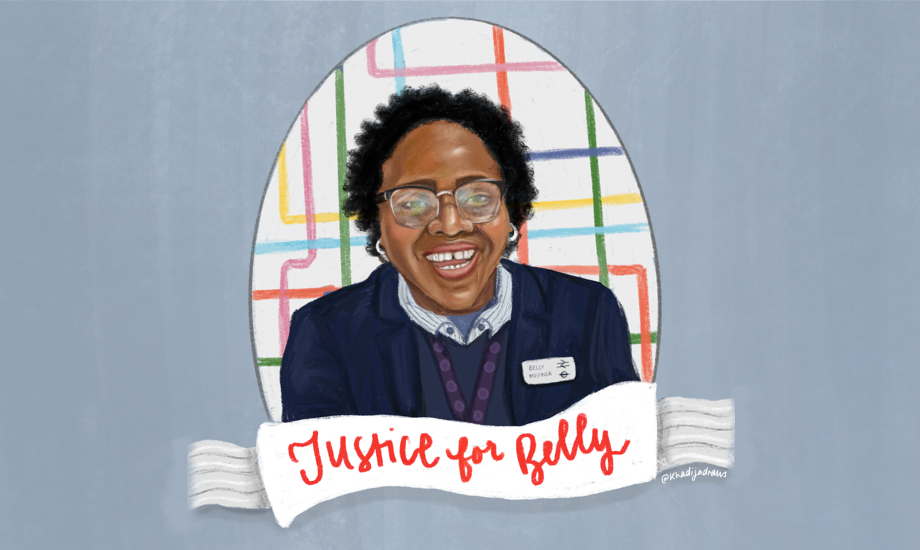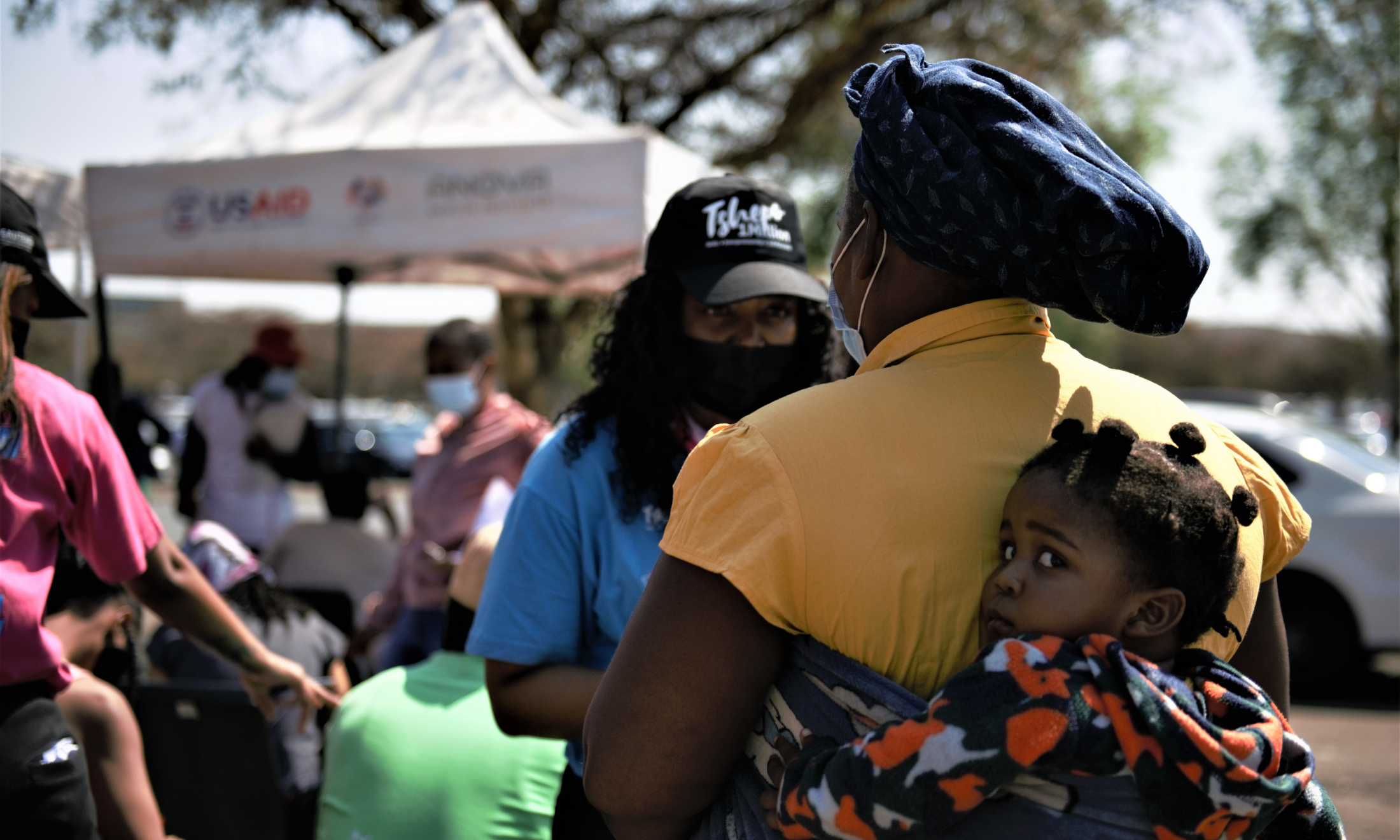
Illustration by Khadija Said
Bosses saw Belly Mujinga’s life as disposable, joining a union is our only defence against them
Belly's employer was aware of her respiratory health issues but continued to send her out to work in Victoria station without any PPE.
Leah Cowan
14 May 2020
Illustration by Khadija Said
“We begged not to go out. We said: ‘Our lives are in danger.’” These are words spoken by a colleague of Belly Mujinga, 47, a ticket officer in London who died of Covid-19 last month after being spat at by a man who claimed to have the virus. Belly’s colleague’s pleas shed light on the danger she was knowingly placed in by her employer, Govia Thameslink, who was aware of Belly’s respiratory health issues but continued to send her out to work in Victoria station without any personal protective equipment (PPE). Southern Railway and Gatwick Express, which is owned by Govia, have said they are “investigating these claims”, but this lukewarm action comes too late for Belly, who is survived by her 11-year old child Ingrid.
It comes as no surprise that bosses are continuing to treat people of colour (PoC) as if they are disposable. In a time of crisis when people are losing income, facing housing instability and dealing with healthcare concerns, many people can’t afford to stay at home even if working poses significant risks to them and the people they live with. Many other key workers like Belly (who Priti Patel might in usual circumstances categorise as “low-skilled”) are being pushed to work in unsafe conditions. In April Emanuel Gomes, a cleaner at the Ministry of Justice died of the virus after working in the offices for five days because he couldn’t afford to lose income. Last month Nimo Omer, writing for gal-dem, also reported that people of colour (PoC) working in healthcare are dying of the virus at disproportionate rates due to a lack of PPE, and the ONS confirmed that black people are four times more likely to die of Covid-19.
“Boris is more invested in rebooting the economy than protecting the lives of the most precarious workers”
Last weekend, Boris Johnson encouraged people to go back to work (while also somehow avoiding public transport) and to put their health on the line in the middle of a global pandemic. It’s clear that Boris is (and always has been) more invested in rebooting the economy and getting profits pouring back into bosses’ pockets, than protecting the lives of the most precarious workers. In a speech in February, he outlined his primary commitment to avoiding “unnecessary economic damage” by enacting the lightest lockdown possible, and presented the UK as a capitalist superhero, ready to “take off its Clark Kent spectacles” and to emerge as the “supercharged champion of the right of populations of the earth to buy and sell freely among each other”.
In a system where profit is prioritised over people, workers’ physical and mental safety becomes an afterthought, with companies offering performative or ad hoc wellbeing support without actually meaningfully upholding worker’s rights. Job insecurity, working long hours and late salary payments lead to situations where, for example, a quarter of construction workers have contemplated suicide, and, in the context of Covid-19 in particular, a third of teachers are experiencing heightened stress and anxiety.
A 2015 report by the Trades Union Congress (TUC) revealed that since the 2008 financial crash, PoC have been disproportionately represented in more precarious and low-paid jobs, where bosses will often attempt to disregard basic workers rights such as entitlement to sick pay, holiday pay, pensions and safe working conditions. This precarity and exploitation is compounded for any worker living at the intersections of oppression such as racism, sexism, transphobia, homophobia, ableism and more.
In a system where businesses and organisations have the pursuit of profit as a primary goal, a worker who is given just a slice of the money they make for the company, let alone being pushed to their physical or mental limits, is being underpaid and exploited. In reality, under capitalism, all wage labour is exploitation. The profit that workers make is funnelled into the pockets of bosses, owners, and shareholders, and not handed down to the people who have actually been doing the work.
A common metaphor is that we might spend the first hour or so of our days making the money we will actually take home in our paychecks, but the rest of the day we will spend working unpaid to make money that goes into our boss’ bank account. The difference between the worker and the boss is not that the boss is smarter, or that the worker is “low-skilled”, or less deserving of wealth or health, but simply that we must sell our labour to pay our bills, whereas our employers get rich off our toil.
“In the wake of this bare-faced disregard for workers, there has been a rallying cry for us all to join trade unions”
In the wake of this bare-faced disregard for workers, there has been a rallying cry for us all to join trade unions. Belly was a member of the Transport Salaried Staffs Association (TSSA) which has issued a list of demands following her death, including that staff should have PPE, and that anyone with an underlying medical condition should be stood down immediately. The TSSA has also reported the incident to the Railways Inspectorate and is supporting her family and colleagues.
Elsewhere, an irritating gaggle of media pundits have been flaunting their predictably anti-union bias: as teacher’s unions stepped forward to protect teachers who face being forced to return to unsafe working conditions, concerns were expressed that the UK would be “brought to its knees by unions”, who have been criticised for being “obstructive”. They’re half right. Unions exist to provide a mechanism through which workers can collectively organise for better conditions for everyone: they are a protective barrier between us and our bosses and the only way through which we can leverage power in negotiations with the people we sell our labour to. The power of collective organising deeply irritates commentators who think that workers should just be grateful for a job.
Judging by the moves made across sectors to cut salaries and push down working conditions in order to make up flailing profit margins, we should all be thinking seriously about the steps we can take to protect ourselves and other workers. For PoC workers in particular, joining a union is the best chance we have to pushback against a system not invested in our safety or survival. Bosses being held to account and being forced to act with more respect for its workers is too late for Belly, but for her colleagues and workers across the country, there is a long road of struggle ahead and we have the power to make change together.
4 things you can do to support workers during the pandemic and beyond:
1. Join a union and know your rights. You can find the right union for you by using the TUC’s union finder or checking out smaller unions such as UVW, IWW and IWGB. Take note that Section 44 of the Employment Rights Act 1996 provides workers with the right to withdraw from and refuse to return to a workplace that is unsafe. The TUC states that: “there have been several examples of union branches walking off the job citing this law. Where reps feel their workplace is unsafe due to Covid-19 contamination, they should contact their union’s legal team for urgent advice on taking action.”
2. Donate to smaller unions that are run by and for the lowest paid and most precarious workers. You can also donate your time and skills and help small unions (or your own union) with things like administration, translation, accountancy etc.
3. If you are an employer, continue to pay the people you employ such as cleaners and childcare workers, even if they can’t come to work. Pay your workers decent sick pay, top-up furlough pay wherever possible, and provide PPE.
4. Contribute to the fundraiser for Belly’s family.

Britain’s policing was built on racism. Abolition is unavoidable

How Pakistan’s Khwaja Sira and transgender communities are fearing and fighting for their futures

Their anti-rape performance went viral globally. Now what?






